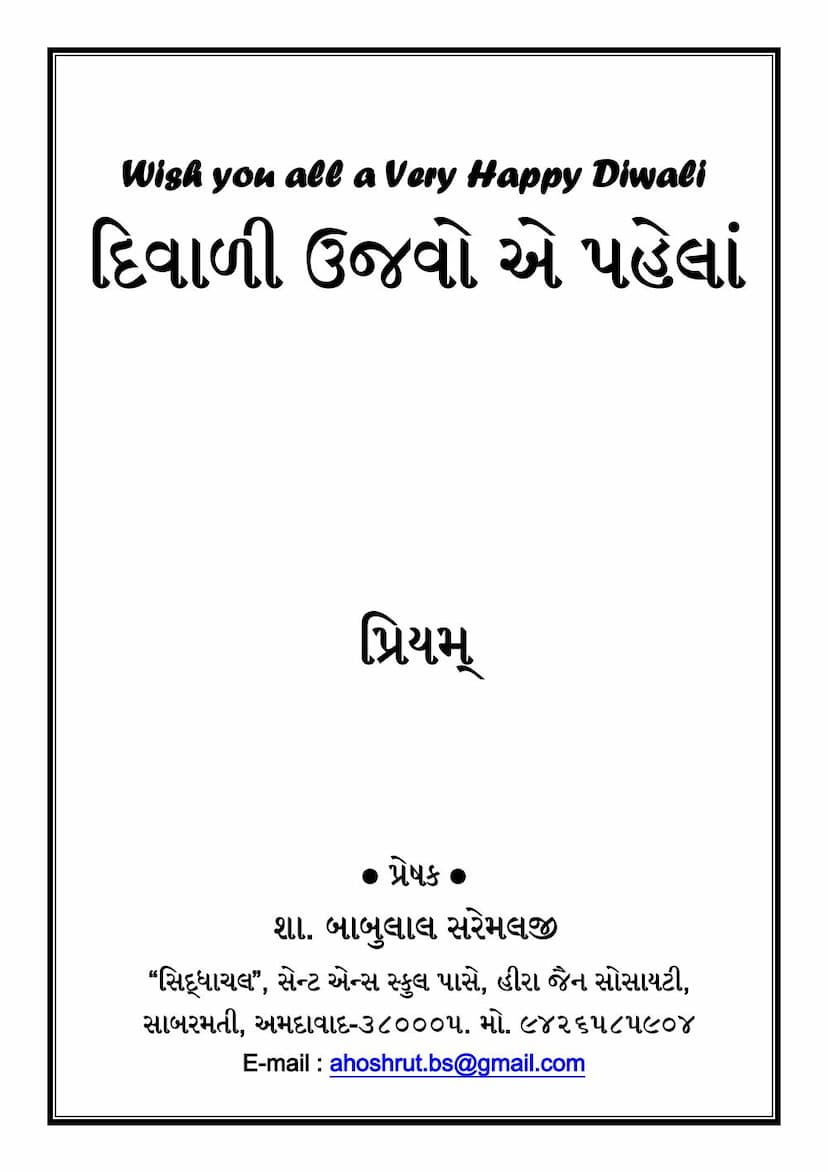Diwali Ujvo E Pahela
Added to library: September 1, 2025

Summary
Here's a comprehensive summary of the Jain text "Diwali Ujvo E Pahela" by Priyam, based on the provided pages:
Overall Theme: The book advocates for a mindful, compassionate, and environmentally conscious celebration of Diwali, urging readers to reconsider the traditional emphasis on firecrackers and instead focus on kindness, well-being, and spiritual growth.
Core Message - Rethinking Diwali: The central message is a powerful plea to celebrate Diwali "before" engaging in typical festivities like buying firecrackers, new clothes, or performing rituals. The author, Priyam, promises that following their advice will make this Diwali a truly meaningful one.
Critique of Firecrackers:
- The Illusion of Happiness: The book challenges the ingrained belief that firecrackers bring happiness, arguing it's a borrowed notion, not based on personal experience or reflection.
- Sensory Overload and Harm: Priyam vividly illustrates the negative sensory experience of firecrackers by asking if one would enjoy the sound and smoke if captured and forced upon them. This highlights the inherent discomfort, potential for harm (hearing loss, suffocation, death), and the fact that what is unpleasant for oneself cannot be justified for others.
- Impact on Animals: A significant portion of the book is dedicated to the devastating effects of firecrackers on animals. Through poignant narratives from the perspective of a bird and a cow, the author depicts:
- Birds: A mother bird's agony as her chick dies from the terror and shock of loud explosions during Diwali, highlighting the fear, coldness, and ultimate loss.
- Cows: The suffering of cows, revered as mother figures, who are subjected to the fear and physical harm caused by firecrackers, leading to miscarriages and injuries.
- Dogs: The distress of dogs, accustomed to being pets, who are injured and terrified by the noise and indiscriminate throwing of firecrackers.
- Sound and Air Pollution: The text explicitly mentions the negative impact of noise and air pollution from firecrackers, likening the sound to someone drilling nails into one's ears and the pollution causing various ailments.
- Environmental Destruction: The book describes how firecrackers cause fires, destroying nests, eggs, and homes of birds and potentially harming other creatures.
- Unnecessary Expenditure: The author questions the wisdom of spending vast sums of money on firecrackers, suggesting these funds could be used to alleviate the suffering of the poor, prevent suicides, or help animals.
Critique of Materialism and Selfishness:
- Focus on Wealth: The book critiques the materialistic approach to Diwali, emphasizing that true wealth lies not in accumulating possessions but in inner peace, kindness, and the well-being of others.
- The Meaning of Wealth (Lakshmi): The concept of Lakshmi (Goddess of Wealth) is explored. True wealth, it suggests, grows through love and compassion, not just ritualistic worship. Unethical acquisition of wealth is portrayed as temporary and ultimately destructive.
- The Emptiness of Material Success: The book contrasts the superficial happiness of material wealth with the genuine joy found in sharing, helping others, and living a life of contentment, even with limited resources. It highlights the plight of the wealthy who are often plagued by health issues, emotional emptiness, and broken relationships.
- Consumerism: The author encourages limiting the purchase of new clothes and shoes and instead donating excess to charity, emphasizing that true humanity lies in giving.
Spiritual and Ethical Teachings:
- Ahimsa (Non-violence): The core Jain principle of Ahimsa is implicitly and explicitly woven throughout the text. The suffering caused by firecrackers to all living beings is presented as a violation of this principle.
- Compassion and Empathy: The book strongly advocates for developing compassion and empathy for all creatures, urging readers to step into the shoes of those affected by their actions.
- The True Meaning of Knowledge: The text emphasizes the importance of respecting knowledge and its tools, as exemplified by the reverence for books and letters, which are seen as symbols of Goddess Saraswati. It criticizes the misuse and disrespect of these tools.
- The Power of Sound: The book touches upon the science of sound, highlighting how ancient Indian musical Ragas have positive effects, while jarring noises and explosions are detrimental to well-being.
- Universal Divine Presence: Quotes from various religious figures (God Mahavir, Lord Krishna, Prophet Muhammad, Jesus Christ) are included to underscore the universal message of compassion, kindness, and the interconnectedness of all life. They all emphasize refraining from causing harm.
Call to Action - Celebrating a Different Diwali:
- Share the Message: Readers are encouraged to share the book's message and convince others to refrain from using firecrackers.
- Spread Awareness: Organizing seminars and talks in schools and colleges about the negative impacts of firecrackers is suggested.
- Acts of Kindness: Distributing food and sweets to the less fortunate, animals, and birds is promoted as a way to spread true joy.
- Focus on Sharing: The book champions the culture of sharing and communal eating over solitary indulgence.
- Inner Transformation: The true "New Year" is defined not by the calendar but by personal growth, shedding vices, cultivating virtues, and living for the betterment of others.
Conclusion: "Diwali Ujvo E Pahela" is a powerful and moving appeal to transform Diwali from a spectacle of noise and destruction into a festival of love, compassion, and conscious living. It urges readers to open their minds and hearts to the suffering of others and to embrace a celebration that brings genuine happiness and peace to all.